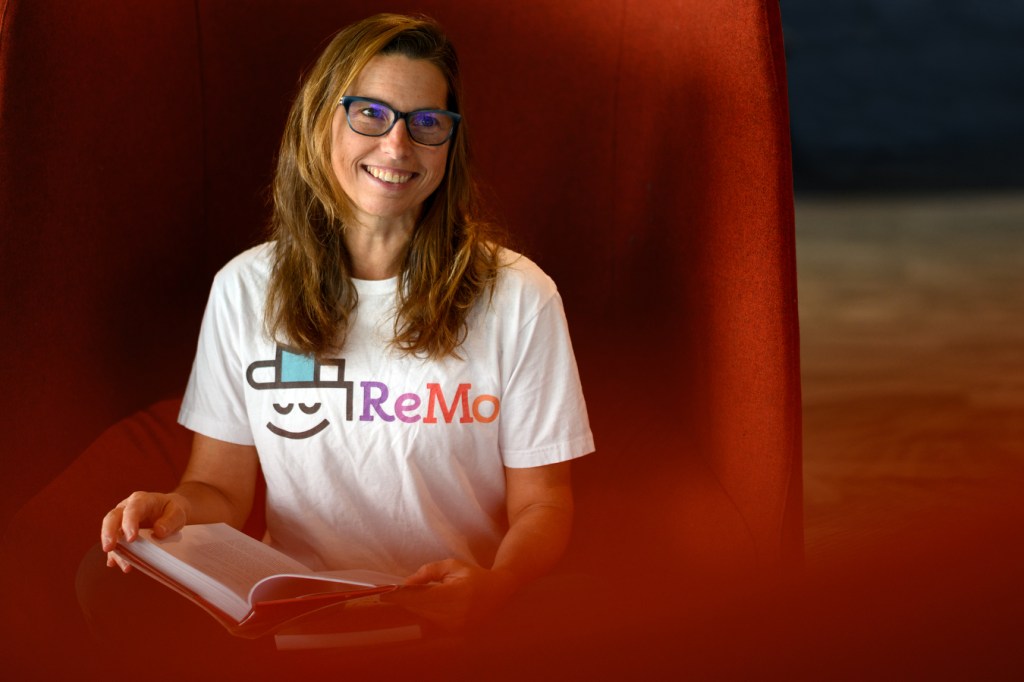Startup reading app ReMo gets a big development push at Northeastern’s Roux Institute

PORTLAND, Maine—After spending nearly 20 years in the classroom trying to improve literacy among her many students, Michelle DeBlois grew frustrated that she couldn’t do more.
Until now.
DeBlois believes she has developed a way to encourage students to read more and empower teachers to manage that goal.
Along with Kathryn Lariviere and Peter Janett, DeBlois founded ReMo, a web-based application created for students and literacy educators in grades 4-12 to inspire independent reading and create lifelong, engaged readers. DeBlois, CEO and founder, recently left her teaching career to further develop ReMo at Northeastern’s Roux Institute. ReMo founder and CFO Lariviere has been a teacher for 20 years, and founder and CTO Janett is a website and app developer.
“So it started when I was teaching and I was really frustrated because I had over 70 students and I couldn’t keep track of all the books that they were reading, and I couldn’t really give them the support that they needed. And so I decided to become part of the solution,” DeBlois said.
“I was like, ‘I’m gonna fix this.’ And so we created ReMo and we beta-tested it for the last two years. And we found that 25% of the students that viewed themselves as nonreaders believed they were readers by the end of the year,” she said.
ReMo is one of five startups in the Roux Institute’s Founder Residency program that started in July and were featured in the Roux’s Venture Showcase this fall. The program helps new business ventures develop business plans and raise investment funds to grow the companies.
The startups take up residency at the Roux for a year and receive guidance on building their businesses. DeBlois is working at the Roux to further develop the company’s business plan and scale for growth.
“Roux has really helped us on a number of levels. First of all, we have this awesome space to work in. We have great mentors. We get one-on-one time and also are able to call on those mentors if we need help,” DeBlois said. “All of the five founders are just so amazing and so knowledgeable that we can lean on each other for support. I think Roux really pushed us to go to market. I think we’re kind of, as educators, we’re very cautious and kind of humbled by nature and Roux kind of fired us up.”
The Roux Founder Residency program helps early stage companies by surrounding them with the resources they need to increase their ability to succeed, said Chris Wolfel, head of entrepreneurship and venture creation at the Roux Institute. The resources include workshops, mentors, talent, customers and capital.
“This may be controversial but starting a business is easy, there are a few forms to fill out and you can ‘have a business.’ But building a business, a team, and growing it is incredibly hard. We surround companies with support systems that are designed to help them grow,” Wolfel said.
After kicking the idea around for a couple of years, the reading app got off the ground in 2018 and incorporated in 2019. ReMo developed the first prototype in 2020 and continues to test in classrooms. There are 37 teachers in eight schools in Maine, with a total of about 1,000 students using ReMo, according to DeBlois. They have been adapting the app through surveys of students and teachers.
Three schools became paid pilot programs in September, and ReMo aims to line up more early adopters in the spring before fully launching the program next September.
“This team (ReMo) knows the space, is passionate about making an impact on a problem they have seen firsthand,” Wolfel said. “Personally, I’m a huge fan of any business that has the potential to do well financially as well as good in the world, and ReMo fits that perfectly.”
ReMo manages and organizes information on books available to students, helps educators keep track of the reading materials and maintains information about students’ reading progress, according to the ReMo website.
“The teachers really love it because, one, they have all the data in one spot, which they really enjoy. They get to have conversations with kids, they get to know their kids sooner,” DeBlois said. “They get to find books like when they’re searching for a book, they’re like, ‘Oh, I need this book on the Holocaust or something.’ They now have a way to search their classroom library where before they didn’t. And they’re finding that engagement, student engagement, has gone up.”
The ReMo application has two different main pages, or dashboards, one for teachers and one for students. The educators’ main page has four categories: books, classes, reading and education tools. For example, the reading category shows a students profile, bookshelf, individual reading lessons, reading logs and reading log reports.
The app allows teachers to monitor what the students are reading and how often, see their reading reports, give feedback to the students, add books to the library, and make suggestions.
“So the teacher gets a lot of discretion about what books are in the classroom library, how many times their kids read, when their kids read, how many reading logs, or how many reading responses that they do,” DeBlois said.
The students see two main categories on their dashboard: books and reading, which, like the educators’ dashboard, open to other pages. The student establishes reading goals; selects books from the library, which offers lists by genre and includes descriptions; logs reading time and pages; does self-evaluations on reading; and follows reading lessons.
The data on the students reading, reading rate, pages and books build confidence in the students and they think of themselves as readers, DeBlois said.
“The kids like it too,” DeBlois said. “It depends. If they’re a reader, they love it. If they’re a non-reader, they like it, they like it more than the paper. They like to see their own data, they realize that they’re reading more than they were before. And they start to view themselves as readers and get in the habit of reading. Eventually, it changes their attitude about reading and they read more.”
ReMo grows with students every year, DeBlois said, and the data stays with them through 12th grade.
Deborah Mills-Scofield—a Roux mentor who is working with DeBlois; founder of Finding Blue Lobsters, which helps companies develop and grow; and a former partner at a venture capital firm—said the Roux program offers a tremendous boost to ReMo and other startups.
“(The Roux) gives honest assessments. I wouldn’t be putting the time and effort in if I didn’t think it was a really great, great program. These people are lucky to be in the Roux. But I also think, from several (startups) that I’ve seen, the Roux is lucky to have them too, because it adds credibility, it helps broaden the base.
“I have seen a lot of accelerator and incubator programs, and a lot through universities, and I’m really, really impressed with the Roux’s Founder Residency program,” Mills-Scofield said. “They really provide them with support with the network, the fundraising that they have enabled these companies to raise.”
Mills-Scofield said ReMo is doing critical work that truly matters and can make a difference in society. ReMo continues to gather data to qualitatively show how the app increases students’ literacy, she said, and with those results more pilots become paying customers.
For media inquiries, please contact media@northeastern.edu.






